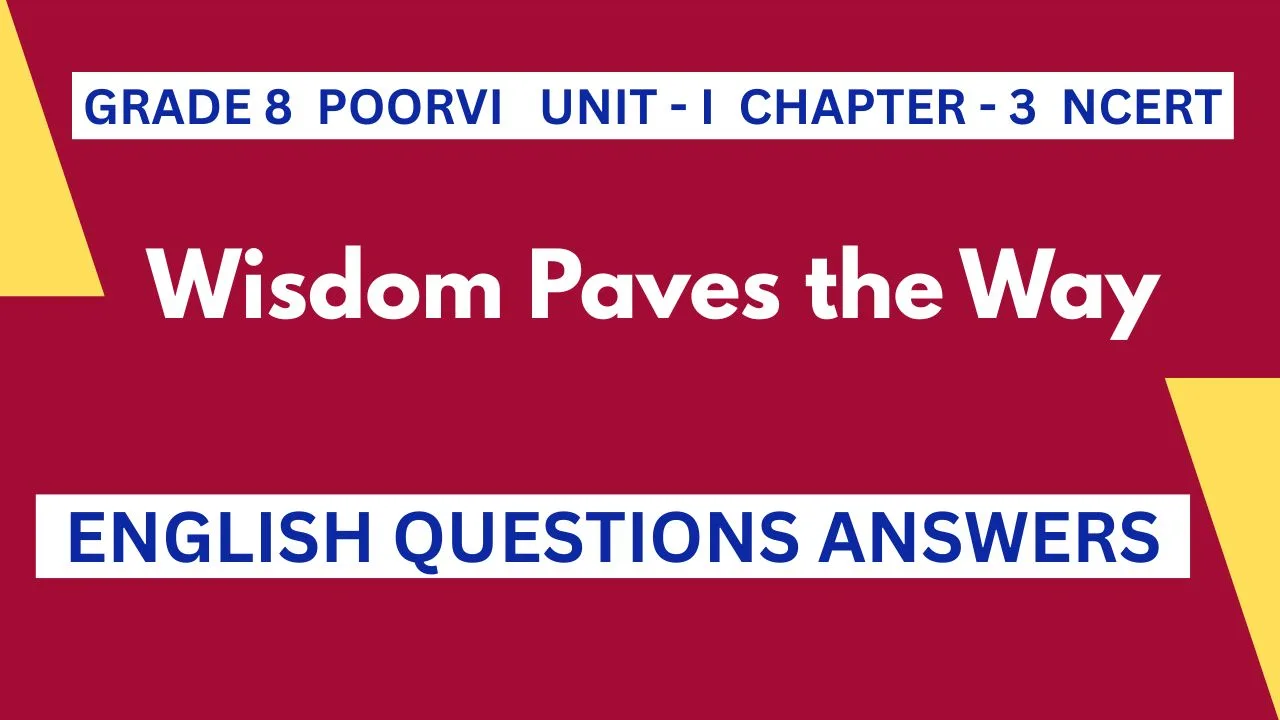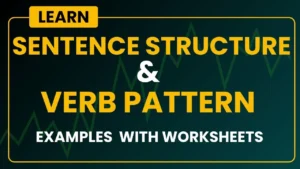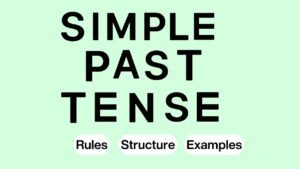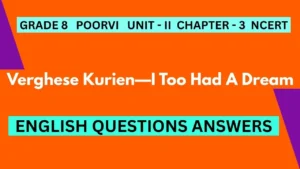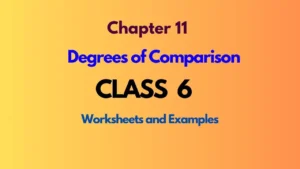Wisdom Paves the Way Questions Answers – UNIT I Chapter 3 English Class 8 NCERT provide students with clear and precise solutions to understand the story better. These questions and answers help learners grasp the importance of intelligence, observation, and reasoning in everyday life. They serve as a useful guide for exam preparation and conceptual clarity.
Let us do these activities before we read. (Page 27)
I Why do we seek advice of the elderly in our family? Share your thoughts with your classmates and teacher.
Answers:
We seek advice from the elderly in our family because they have experience and wisdom gained from life. They have faced many situations and can guide us to make better decisions. Their suggestions help us avoid mistakes, solve problems wisely, and understand the consequences of our actions. Moreover, elders often provide moral guidance and teach values, helping us grow into responsible and thoughtful individuals. Their advice is trusted because it comes from knowledge combined with life experience.
POORVI: Textbook of English for Grade 8 NCERT Solution 2025-2026:
II Knowledge is about learning facts and information, while wisdom is about using that knowledge with good judgement.
Answers:
| Situation | Knowledge / Wisdom |
| 1. Riya’s understanding of plant care helped her grow a healthy vegetable garden in her backyard. | Knowledge |
| 2. Mr. Kumar values time with family over chasing wealth. | Wisdom |
| 3. Karuna’s expertise in computer programming helped her develop a successful app. | Knowledge |
| 4. Rohan understood the value of time management and created a timetable to complete his assignments systematically. | Wisdom |
| 5. Ramesh chose to forgive his friend for a misunderstanding. | Wisdom |
| 6. Ms. Vaijayanthi delivered a lecture on Indian Classical music at the cultural festival. | Knowledge |
III Observe the picture carefully. What do you think might have happened? Share your answers with your classmates and teacher.
Answers:
From the picture, it looks like a mischievous monkey is on the roof of a house, causing some trouble. The man standing outside seems upset or worried, possibly because the monkey has damaged the roof or stolen something. The women are looking at the scene, maybe surprised or concerned. A cat is watching from the tree, perhaps curious or ready to escape. The broken parts of the roof suggest that the monkey is creating chaos, and the people are discussing how to handle the situation. Overall, it shows a village scene disrupted by a playful or naughty animal.
Scene I: The Road to Ujjain
Summary:
Four young men—Ram Datt, Shiv Datt, Har Datt, and Dev Datt—travel on a dusty road to Ujjain, seeking work and hoping to meet the King. Along the way, they notice fresh camel tracks and each observes a peculiar detail about the animal. Soon, a distressed merchant arrives, searching for his lost camel. The men accurately describe its lameness, blindness in one eye, short tail, and stomach pain, though they insist they have never seen it. Suspicious, the merchant accuses them of theft and insists they accompany him to the King’s court.
Word Notes:
Resplendent : Bright and beautiful : उज्ज्वल और सुंदर
Resolute : Determined : दृढ़ निश्चयी
Prospect : Possibility : संभावना
Eludes : Escapes : बच निकलना
Precise : Exact : सटीक
Befitting : Suitable : उपयुक्त
Audience : Meeting with someone important : मुलाकात
Recognise : Acknowledge : पहचानना
Talents : Skills : प्रतिभा
Devise : Plan : योजना बनाना
Deliberate : Discuss carefully : विचार-विमर्श करना
Observe : Notice : देखना / निरीक्षण करना
Scrutinise : Examine closely : बारीकी से जांचना
Peculiar : Strange : अजीब
Unique : One of a kind : अद्वितीय
Haste : Hurry : जल्दी
Countenance : Facial expression : मुखमुद्रा
Distressed : Troubled : परेशान
Astonished : Surprised : आश्चर्यचकित
Indignant : Angry due to unfairness : आक्रोशित
Let us discuss (Page 32)
I Complete the following sentences with suitable reasons. One example has been done for you. Share your answers with your classmates and teacher.
Answers:
1. Shiv Datt said, “I believe it has been over a week, perhaps even longer,” because it had been a long time since they left the village.
2. Dev Datt said, “Indeed, we ought to be united in this hope. That is why we press on towards Ujjain,” because they hoped the King would recognise their talents and appoint them to his service.
3. Har Datt said, “Look there, friends. A camel has passed this way. The tracks are fresh,” because he saw fresh camel tracks on the road.
4. Shiv Datt said, “It appears to be a merchant, running as if pursued by trouble,” because he saw a merchant running towards them in haste.
5. The merchant said, “How could you possibly know that? The poor creature has been unwell for two weeks now. Surely you are a healer!” because Dev Datt had guessed that the camel was suffering from a pain in the stomach.
6. Dev Datt said, “You are free to do as you wish, sir. If the King desires our presence, we shall be waiting under that banyan tree yonder,” because they were not afraid to meet the King and were willing to wait under the banyan tree.
Scene II: The King’s Court
Summary:
In Scene II, the King of Ujjain is seated on his grand throne, surrounded by courtiers in a richly decorated hall. The Merchant and a Sentry come to the court, seeking justice. The Merchant accuses four young men—Ram Datt, Shiv Datt, Har Datt, and Dev Datt—of stealing his camel. He claims that the young men know every detail about the camel and therefore must be the thieves.
The King asks the young men to explain their knowledge. Ram Datt states that he observed from the camel’s tracks that it is lame in one leg, as three prints are clear while the fourth is faint. Shiv Datt explains that the camel is blind in its right eye because it had eaten only from the left side of the road. Har Datt notices the camel has a short tail, as small mosquito bites were left on the track that a long tail would have prevented. Dev Datt points out that the camel moves carefully due to a stomach pain, which makes the hind legs leave faint prints.
The King is astonished by their sharp observation, reasoning, and intelligence. He tells the Merchant that his accusations are baseless, explaining that these young men are wise, not thieves. The Merchant feels ashamed and leaves the court embarrassed.
Impressed by the young men’s ability to “see beyond the obvious,” the King offers them positions as his advisers. They accept the honour humbly, promising to dedicate themselves to the King’s service and to provide their wisdom and counsel in all matters. The King announces their new roles to the court, praising their intelligence and stating that their wisdom will guide the kingdom to prosperity. The courtiers applaud, and the young men feel proud and fulfilled, as their journey leads to a reward they had never expected.
Word Notes:
Throne : Seat of a king : सिंहासन
Courtier : A person in the king’s court : दरबारी
Adorned : Decorated : सजाया हुआ
Draperies : Curtains or hanging cloths : परदे/सजावटी कपड़े
Regal : Royal, kingly : शाही
Bearing : Demeanor, manner : व्यवहार/भंगिमा
Grievance : Complaint : शिकायत
Accuse : Charge someone with a fault : आरोप लगाना
Accused : Person charged with a crime : आरोपी
Observation : Careful watching : अवलोकन
Deduce : Conclude logically : अनुमान लगाना
Distinct : Clear, noticeable : स्पष्ट
Faint : Weak, not clear : हल्का/धुंधला
Impressions : Marks left by feet : छाप
Insight : Deep understanding : सूझ-बूझ
Deduction : Reasoning : तर्क/निष्कर्ष
Flawless : Perfect, without mistakes : त्रुटिहीन
Baseless : Without reason : निराधार
Misguided : Wrongly directed : भटकाया हुआ
Chastened : Made to feel sorry : शर्मिंदा
Embarrassed : Ashamed : लज्जित
Remarkable : Extraordinary : असाधारण
Counsel : Advice : सलाह
Beacon : Guiding light : प्रकाशस्तम्भ/मार्गदर्शक
Honour : Respect or privilege : सम्मान
Privilege : Special advantage : विशेषाधिकार
Humbled : Feeling modest or respectful : विनम्र/नम्र
Prosperity : Success and wealth : समृद्धि
Let us discuss (Page 36)
I Arrange the following events in order of their occurrence from Scene II of the play. One example has been done for you. Share your answers with your classmates and teacher.
Answers:
- (3) The King asks the merchant to clearly state his accusation.
- (8) The merchant accuses the four men of knowing a lot about his missing camel.
- (2) Ram Datt explains how he infers from the tracks that the camel is lame.
- (5) Shiv Datt reveals that the camel is blind in its right eye as it had only chewed on the leaves on the left side of the road.
- (7) Har Datt clarifies how he knew that the camel has a short tail.
- (6) Dev Datt explains his observation about the camel’s pain and careful movement.
- (4) The King praises the young men for their observations and dismisses the merchant’s accusation.
- (1) The King makes the four young men his advisers, impressed by their skills.
Let us think and reflect (Page 37)
I Read the given extracts and answer the questions that follow.
Dev Datt: Ten days are but a short span in the grand scheme of things. We may still have many more roads to wander before we find employment befitting all four of us.
Ram Datt: If only we could secure an audience with the King of Ujjain. I am confident he would recognise our talents and appoint us to his service.
Shiv Datt: I share your belief.
Dev Datt: Indeed, we ought to be united in this hope. That is why we press on towards Ujjain.
Har Datt : (Pausing thoughtfully) Gaining an audience with the King is no simple task. We need to devise a strategy.
(i) Identify the false statement from the two given below and rectify it.
A. Dev Datt believes that finding employment is an easy task.
B. Ram Datt is confident that the King would recognise their talents.
(ii) What does Ram Datt’s confidence in gaining the King’s recognition tell us about him?
(iii) Complete the sentence given below with the correct option from those given. In the line, ‘That’s why we press on towards Ujjain’, the phrase ‘press on’ refers to __________.
A. walking with heavy steps
B. moving forward with determination
C. slowing down frequently for rest
D. stopping briefly to save time
(iv) Har Datt says, “We need to devise a strategy.” What can be inferred about Har Datt’s character from his statement?
A. He is doubtful of their abilities and wants to give up.
B. He is eager to rush into the palace without preparation.
C. He is cautious and thoughtful, preferring to plan ahead.
D. He relies on others to make decisions for the group.
Answers:
(i) False statement: A. Dev Datt believes that finding employment is an easy task.
Rectified statement: Dev Datt believes that finding employment may take a long time and require travelling many more roads.
(ii) Ram Datt’s confidence in gaining the King’s recognition shows that he is optimistic, self-assured, and believes in his and his companions’ talents.
(iii) Correct option: B. moving forward with determination
(iv) Correct option: C. He is cautious and thoughtful, preferring to plan ahead.
II Read the given extracts and answer the questions that follow. (Page 38)
King : (To the four men) You have demonstrated remarkable intelligence and the ability to see beyond the obvious. Such minds are rare and highly valued in my court. I extend to you the honour of becoming my advisers. Your counsel shall guide my decisions, and your wisdom shall be a beacon for my kingdom. What do you say to my offer?
Ram Datt: (Stepping forward) Your Highness, it is an honour we had not dared to dream of.
Select the option that is true for both Assertion (A) and Reason (R).
(A): The Merchant left the court feeling humbled and ashamed.
(R): The King commanded that the four wise men join his court.
A. Both (A) and (R) are true, and (R) is the correct explanation of (A).
B. Both (A) and (R) are true, but (R) is not the correct explanation of (A).
C. (A) is true, but (R) is false.
D. (A) is false, but (R) is true.
(ii) Complete the following sentence by choosing the correct option. The line, ‘See beyond the obvious’ means that the men had the ability to ______.
A. challenge common beliefs with reasoning
B. interpret information in traditional ways
C. notice details that others might overlook
D. predict what is going to happen in the future
(iii) Complete the following sentence with a suitable reason. Ram Datt described the King’s offer as ‘an honour we had not dared to dream of’ because ___________.
(iv) How does the King’s offer to the four men reflect his values as a ruler?
Answers:
(i) Correct option: B. Both (A) and (R) are true, but (R) is not the correct explanation of (A).
(Reason: The merchant left humbled because the King dismissed his accusation, not directly because the four men joined the court.)
(ii) Correct option: C. notice details that others might overlook
(iii) Ram Datt described the King’s offer as ‘an honour we had not dared to dream of’ because they had not expected such a high position and recognition from the King when they were merely seeking employment.
(iv) The King’s offer reflects that he is a wise and just ruler who values intelligence, fairness, and the ability to think deeply. He rewards merit rather than making decisions based on suspicion or appearances.
II Answer the following questions. (Page 39)
1. What does the dusty road leading to Ujjain tell us about the challenges of the young men’s journey?
Ans: The dusty road to Ujjain shows that the journey was long and tiring. The four young men had to walk far, facing heat, dust, and no easy rest. They still kept moving forward, hoping to find good work. Har Datt said meeting the King would not be easy, showing they knew their goal needed effort and planning. The dusty road is a sign of the hard work, patience, and determination they needed to reach the King’s court.
2. Why did the merchant become suspicious of the four men? What does this tell us about him?
Ans: The merchant became suspicious because the four men knew many details about his camel, like its lameness, blindness, short tail, and pain, even though they said they had never seen it. This made him think they must be the thieves. This shows the merchant was quick to judge without proof. He believed such knowledge could only come from stealing, not from observing carefully. His suspicion came from fear of losing his camel, and he did not think of other explanations.
3. How do the four young men’s observations about the camel serve as a turning point in the play?
Ans: The young men’s observations about the camel completely changed the situation. At first, they were accused of being thieves. But when they explained how they understood the camel’s condition from signs on the road, the King was very impressed. Their answers showed sharp minds and great reasoning. This turned the King’s opinion from doubt to trust. Instead of being punished, they were honoured and given important jobs. Their skill in explaining what they saw became the turning point in the story.
4. Why did the King believe the four young men and not the merchant?
Ans: The King believed the four men because they gave clear, logical reasons for everything they said. They explained how they learned about the camel’s injuries and habits from things they saw on the road. Their answers matched each other and showed great intelligence. The merchant only gave suspicion without proof. The King respected the truth and fair judgment, so he dismissed the false accusation. He valued their ability to think deeply and “see beyond the obvious,” which proved their honesty.
5. How does the capability of the four young men make them suitable to become advisors?
Ans: The four men were suitable to be advisers because they could observe small details and think carefully. Ram Datt noticed the camel was lame from its footprints. Shiv Datt saw it was blind in one eye from how it ate leaves. Har Datt guessed it had a short tail from mosquito bites. Dev Datt saw it had stomach pain from how it walked. These skills—watching closely, thinking clearly, and explaining well—are important for giving advice to a King and making wise decisions.
6. Why does the merchant feel ashamed for accusing the four young men of stealing his camel? Explain in your own words.
Ans: The merchant felt ashamed because the King proved his accusation was wrong. The four men explained their observations so clearly that it showed they were wise, not thieves. The King called the merchant’s words “baseless and misguided,” and told him to be careful in the future. Feeling embarrassed, the merchant’s face turned red. He bowed deeply and left the court. He realised he had judged too quickly and unfairly, and it was shameful to be corrected in front of everyone.
Let us learn (Page 39)
I Complete the sentences by filling in the noun form of the textual words given in the brackets.
Answers:
1. Some word games need a lot of thought and deduction.
2. We need to make close observation of animals in order to understand their behaviour.
3. A detailed scrutiny of the documents shows a lot of errors.
4. You should not make any false accusation against anyone.
5. She was given an award in recognition of her contribution to literature.
II Match the expressions in Column 1 with their meanings in Column 2.
Answers:
| Column 1 | Column 2 (Meaning) |
| 1. with all our hearts | (vi) complete sincerity |
| 2. to be precise | (iv) exact and accurate |
| 3. gain an audience with | (v) meeting or hearing someone |
| 4. catch his breath | (vii) to pause or rest for some time |
| 5. erupts in applause | (ii) starts cheering together |
| 6. grand scheme of things | (viii) overall plan of life in a larger context |
| 7. taken aback | (i) surprised |
| 8. more than meets the eye | (iii) hidden information that is not obvious |
III Match the different meanings of ‘face’ and ‘bear’ with the correct usage in the sentences given in the table below. (n. stands for the word noun and v. stands for the word verb.)
Answers:
| Word | Number | Sentence / Meaning |
| face | 1 | (iii) She has a round, smiling face. |
| face | 2 | (ii) The face of the clock was painted red and blue. |
| face | 3 | (iv) We should be ready to face life’s challenges. |
| face | 4 | (i) Ravi turned to face his father, when he was called. |
| bear | 1 | (iv) I can’t bear the sound of vehicles honking. |
| bear | 2 | (iii) Riya agreed to bear the responsibilities with confidence. |
| bear | 3 | (ii) I spotted a bear on a wildlife safari. |
| bear | 4 | (i) The trees that I planted in my garden took a long time to bear fruit. |
IV Match the highlighted words in the sentences in Column 1 with the functions they express in Column 2.
Answers:
| Number | Sentence / Phrase | Function |
| 1 | I will gladly pay your fee if you can cure it. | (ix) willingness |
| 2 | You must have stolen it and sold it off. | (v) logical conclusion |
| 3 | You shall come with me to face the King! | (x) command |
| 4 | How could you possibly know that? | (i) expression of disbelief |
| 5 | I am confident he would recognise our talents and appoint us to his service. | (vi) wish or hope |
| 6 | A camel with a long tail would have fended off these pests with ease. | (ii) imagined (hypothetical) possibility |
| 7 | They may tell us more than meets the eye. | (xi) possibility |
| 8 | May your wisdom shine upon Ujjain and guide us to prosperity. | (vi) wish or hope |
| 9 | Indeed, we ought to be united in this hope. | (iii) moral obligation or advice |
| 10 | We need to devise a strategy. | (vii) necessity |
| 11 | You speak of my camel as if it stood before you, yet you dare to claim not to have seen it! | (iv) challenge |
V Complete the following story with modal verbs in the box given below by using the clues from the functions given within brackets.
| may must should can might could need to |
Answers:
- can (ability)
- must (necessity)
- should (suggestion)
- might (weak possibility)
- must (obligation)
- may (possibility)
- can (ability)
Completed story:
An old man, known for his wisdom, lived in a small village. One day, a young boy asked him, “How can I become wise like you?” The old man smiled and said, “Wisdom must be earned through patience. You should listen, more than you speak.” The boy thought for a while and replied, “It might take years, but I’ll try.” The old man nodded. “You must learn from your mistakes too. Wisdom may come slowly, but it always arrives for those who seek it.” The boy knew he can become wise if he followed the old man’s advice.
VI Rewrite the following sentences using appropriate modal verbs. You may take clues from the highlighted words. One example has been done for you.
Answers:
1. It is advisable for you to think before you speak.
Ans: You should think before you speak.
2. It is unnecessary to worry about things beyond your control.
Ans: You need not worry about things beyond your control.
3. It is not possible for a person to gain experience without taking risks.
Ans: You cannot gain experience without taking risks.
4. It is essential to treat others with kindness, even when they disagree with you.
Ans: You must treat others with kindness, even when they disagree with you.
5. It is not allowed to interrupt when someone else is speaking.
Ans: You must not interrupt when someone else is speaking.
Let us listen (Page 42)
I You will listen to four people sharing their thoughts on why they enjoy witty characters in stories. As you listen, match statements 1–6 given below to the speakers (i)–(iv). There are two statements you do not need. (Transcript for teacher on page 48)
Answers:
| Statement No. | Statement | Speaker No. |
| 1 | Witty characters prove that cleverness is as powerful as strength. | (ii) |
| 2 | Witty characters show us ways to make learning enjoyable. | (iv) |
| 3 | Witty characters in a story keep the reader involved. | (iv) |
| 4 | Witty characters teach me that tricky situations can be managed calmly. | (iii) |
| 5 | Witty characters add excitement to a story by their extraordinary deeds. | (ii) / not used |
| 6 | Witty characters can deactivate tense situations with their cleverness. | (i) |
Let us write (Page 44)
I You have observed that the kutcha road leading to your colony is in a very bad condition due to heavy rains. The potholes are dangerous for people and can lead to accidents. They also serve as a breeding ground for mosquitoes as there is stagnant water all around.
Write a letter of complaint to the Commissioner, Municipal Corporation or the Sarpanch, Gram Panchayat to look into the matter and take necessary action.
Answers:
To
The Commissioner,
Municipal Corporation,
[City Name]
Date: [Insert Date]
Subject: Complaint Regarding the Bad Condition of the Kutcha Road
Respected Sir/Madam,
I am writing to draw your attention to the kutcha road leading to our colony, which is in a deplorable condition due to heavy rains. The road has developed numerous potholes, making it dangerous for pedestrians and vehicles.
The problems that we face are serious. The potholes cause inconvenience as people often stumble or face difficulty while walking. As a result, accidents have become common. Consequently, stagnant water in the potholes has become a breeding ground for mosquitoes, posing a health risk to the residents.
Firstly, I would like to suggest that the road be repaired and properly paved to ensure the safety of everyone. Secondly, proper drainage should be installed to prevent waterlogging in the future. I request you to look into this matter and take swift action to resolve the issue. I look forward to your prompt response.
Yours faithfully,
[Your Name]
[Your Address]
[Contact Number]

